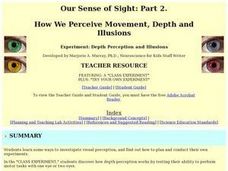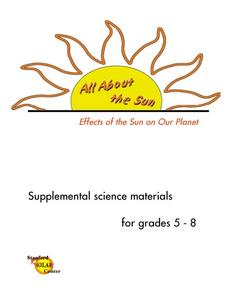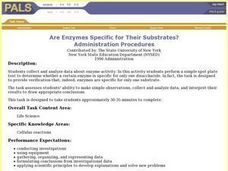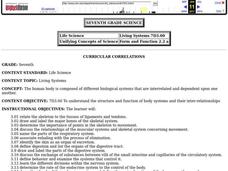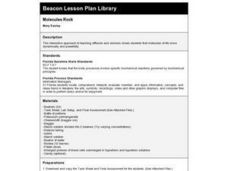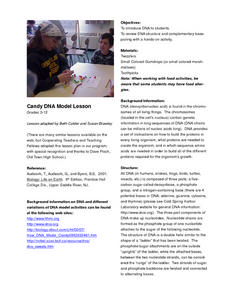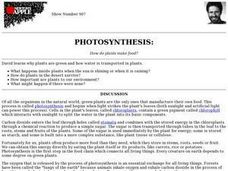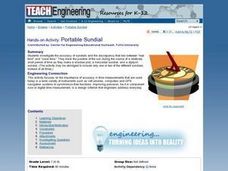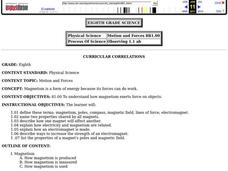Curated OER
Chlorophyll
Learners use thin layer chromatography, TLC, to separate various pigments found in plants.
Curated OER
How We Perceive Movement, Depth and Illusions
Students examine how depth perception works through a class experiment. They design and perform their own experiment that investigates visual illusions.
Curated OER
Effects of the Sun on Our Planet
Young scholars examine the effect of different types of light on the Earth. They discover the role of evaporation and the effects of the sun on the magnetosphere. They also observe different solar phenomena.
Curated OER
Effects of the Sun on Our Planet (Grades 2-4)
Students observe how the sun's rays can cause evaporation and discuss its role in the weather cycle. They discover what the sun's energy brings to plants. They examine how different types of technology can enhance the amount of solar...
Curated OER
Five Kingdoms of Living Things
Fifth graders are introduced to the classification system used in Science. In groups, they explain the characteristics of each of the five kingdoms. After watching a video, they review the life processes of each kingdom and complete a...
Curated OER
Are Enzymes Specific for Their Substrates?
High schoolers discover enzyme to substrate specificity. The experiment uses samples of glucose and lactose in combination with the enzyme lactase. Students observe the reaction between the lactose and the lactase; the lack of a...
Curated OER
Human Body Systems
Seventh graders investigate the structure and function of body systems and their inter-relationships. They draw and label the major body systems, observe demonstrations of various body systems, define key vocabulary terms, and compare...
Curated OER
The Dynamic Earth
Pupils participate in assessments related to the layers of the Earth. They read chapters of text, answer questions, watch videos, and identify and label continents and oceans on a map. They design posters, create vocabulary cards,...
Curated OER
Skeletal, Skin, and Muscular Systems
Eighth graders explain the functions of various body systems. Using a concept map, 8th graders identify and explain the fuctions of the skeletal, skin, and muscular systems of the body. After completing their concept map, students...
Curated OER
Collecting Plankton
In this science worksheet, learners learn facts about plankton by reading two pages of factual information. Students read about the different kinds of plankton and how it is classified. Detailed drawings are included. There are no...
Curated OER
Ingestion
For this ingestion worksheet, 9th graders fill in the blank about ingestion. Students relate the role of saliva, teeth, and the esophagus to their importance in ingestion.
Curated OER
Scientific Method and Graphing
Seventh graders use the scientific method to determine how many seeds are in a watermelon.
Curated OER
Molecules Rock
Fourth graders engage in this interactive lesson which illustrates diffusion and osmosis and shows them that molecules of life move dynamically and powerfully. They must analyze their lab orally and in writing.
Curated OER
Transistor Hunt
Students locate transistor devices in school. They explain the importance of transistors.
Curated OER
Candy DNA Model Lesson
Students explore DNA structure using materials such as Twizzlers, small colored gumdrops and/or toothpicks.
Curated OER
Pregnancy
Students discuss facts and myths associates with pregnancy and how conception can and cannot occur. They study fetal development and review terminology. They play a review game.
Curated OER
Photosynthesis: How do plants make food?
Learners study why plants are green and how water is transported in them. They examine how plants respond to different amounts of light.
Curated OER
Do Different Colors Absorb Heat Better?
Students work together to test how the color of a material affects how much heat it absorbs. They make predictions and take notes on their observations. They discover how engineers use this type of information.
Curated OER
Portable Sundial
Students work together to identify the accuracy of sundials. They track the position of the sun and create a shadow plot. They discover the difference between real time and clock time.
Curated OER
Construction of a Hemoglobin Gene
Learners see how eight pairs of triplets are equivalent to part of a gene and control a part of heredity. They comprehend how blood corpuscles manufacture normal hemoglobin. Students already comprehend that genes control the synthesis...
Curated OER
Science Processes
Fifth graders observe a dry piece of bread and a damp piece of bread in two separate sealed bags that have been sitting for several days that have been labeled. The observe the mold with a hand lens and record findings in their science...
Curated OER
Motion and Forces
Eighth graders define the terms: magnetism, poles, compass, magnetic field, lines of force, electromagnet. They name two properties shared by all magnets and describe how one magnet will affect another.
Curated OER
Heredity, Genetics, Traits
Eighth graders study how an embryo develops into a fetus by undergoing many physical changes which they observe on a poster. They examine the metamorphosis of fruit flies as they develop through a series of changes. They record the...
Curated OER
Diversity And Adaptations Of Organisms
Seventh graders demonstrate the processes of science by posing questions and investigating phenomena through language, methods and instruments of science. They study the body features or systems of several animals.



